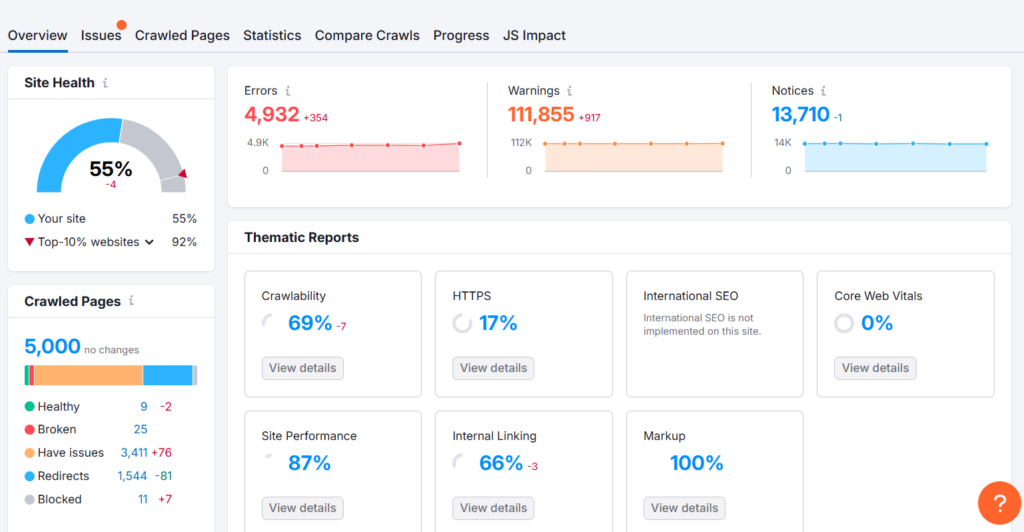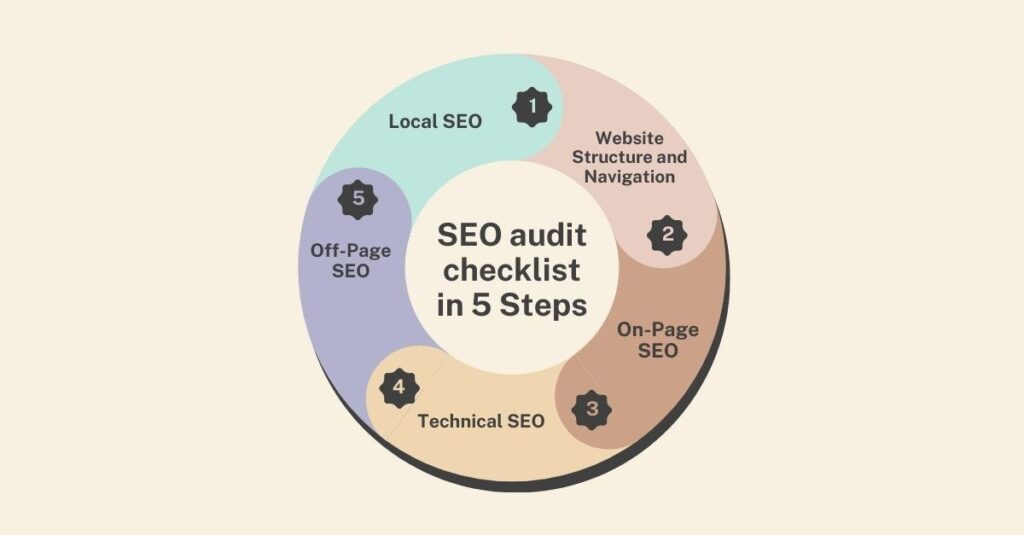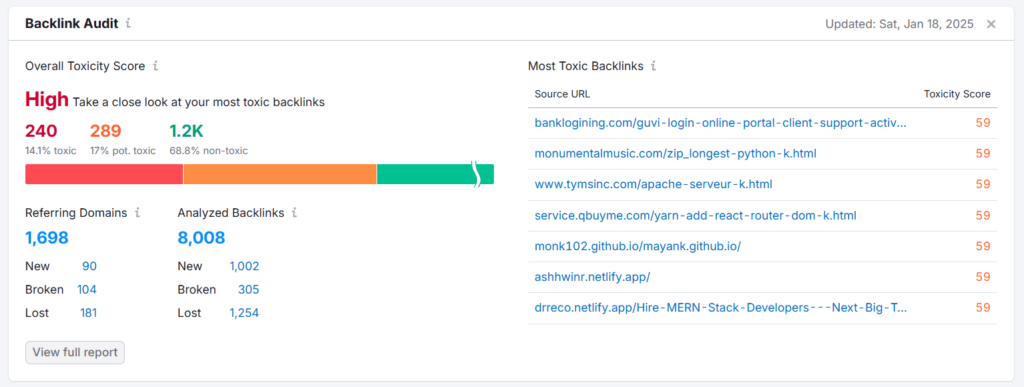- An SEO audit serves as a thorough evaluation of a website’s performance, focusing on its structure, content, and technical aspects to identify areas needing improvement. Regular audits provide an opportunity to adapt to SEO trends as they evolve.
- Understand the major areas of an SEO audit – technical, on-page, off-page, content, and user experience. Doing this will take your SEO success to new heights! Every single one of these components is crucial in boosting your website’s overall performance.
- Having clear goals before starting your SEO audit helps customize it to your specific business needs. This focused approach prioritizes what matters, such as improving your search rankings or increasing traffic.
- Gathering data from various SEO tools will enhance your audit results. Focus on key metrics like traffic sources and bounce rates to gain insights into your website’s performance.
- Implement the recommendations from your audit findings. This will improve your search engine rankings, drive more organic traffic your way, and create a better overall experience on your website. Tackle these efforts in order of importance to make the most impactful changes the fastest.
- Conducting regular SEO audits helps identify these missed optimization opportunities. They ensure that you can stay ahead of the competition in your niche. Keeping up with industry best practices is key to staying ahead of ever-changing search engine algorithms.
What is an SEO audit

An SEO audit is a thorough evaluation of how well your website performs in search engines. Once you know what it’s meant to do, you’ll see why it’s so crucially important.
An SEO audit helps identify what needs improvement by looking at all the moving parts. It’s a comprehensive analysis that addresses site structure, content quality, and technical performance.
This process improves user experience and aligns your site with industry best practices, helping you achieve top search rankings.
Definition of SEO audit
An SEO audit is an in-depth analysis of a website’s architecture. It looks at the content and performance deep dive. This process includes analyzing the technical side of your site, like your overall loading speed, mobile-friendliness, and crawlability.
Slow page loading can drive visitors away before they even engage with your site, harming user experience and hurting your search rankings. An SEO audit can help pinpoint areas for improvement to enhance your visibility in search engines.
Researching the keywords your competitors rank for helps identify gaps in your strategy. This insight allows you to enhance your approach and target valuable keywords for greater visibility. Audits should address both technical and content elements to provide a comprehensive view of your site’s strengths and weaknesses.
Importance of SEO audit for websites

SEO audits are Important for improving a website’s search engine performance. Regular audits help you pinpoint the strengths and weaknesses of your current SEO strategy.
They enable you to respond to the continuous evolution of the digital landscape. If your audit reveals bad internal linking or redirects, go back in and repair the damage. This can significantly enhance user experience and increase your SEO success.
A smart SEO audit can open you up to new streams of visibility and traffic. Audit technical performance, such as mobile-friendliness and loading speed. This alignment with Google’s ranking factors will help your website’s performance skyrocket.
Aligning your SEO strategy can greatly improve your ranking. It also helps you effectively communicate SEO’s value to key stakeholders. Most importantly, an SEO audit reveals valuable opportunities that can maximize your investment.
Gain actionable insights and improve your search rankings by partnering with our dedicated SEO audit professionals today.
Key components of an SEO audit

An SEO audit focuses on key elements that boost visibility and improve user experience. Understanding these components helps identify areas for improvement, allowing you to increase organic traffic to your site.
Let’s break down the essential elements of a thorough SEO audit into five main categories:
Technical SEO assessment
The technical SEO focuses on how easily search engines can crawl and index your website. Verifying that it’s crawlable is crucial. Broken links and slow loading times can impact search engines’ ability to index your pages the right way.
A page that takes more than 3 seconds to load can frustrate visitors and hurt your site’s ranking. Tools like Google Search Console can help you identify and fix these technical issues before they escalate.
Use 301 redirects to manage and merge duplicate page versions. This helps inform search engines which version to prioritize in search results.
On-page SEO analysis

On-page SEO includes all the elements on your webpage that you can control and optimize. Start by checking for problems with meta tags, headings, and keyword targeting.
Try to keep your title tag no longer than 40-60 characters. Ensure it features your main keyword and matches what is present in the H1. Evaluating the structure and readability of your web pages can significantly improve user engagement.
SEO audit Internal linking strategies are one of the most important website features to get right. They allow search engines to crawl your site, help users navigate your content, and pass PageRank to your most critical pages.
Off-page SEO evaluation

Off-page SEO centers on factors outside your website, primarily backlinks. Assessing the quality and relevance of these backlinks is crucial since they directly affect your site’s authority.
Look for new backlink opportunities, and be proactive with outreach to high-quality, relevant sites. Never overlook the potential of social media to strengthen your off-page SEO. Interacting with your audience on these social media platforms increases your reach exponentially!
Understanding what an SEO audit entails is the first step to unlocking your website’s full potential—take your strategy further with our expert SEO services.
Content quality review

It’s important to review your current content to ensure it matches user intent. Content is often the most misunderstood part of an SEO audit.
Find old or thin content that could be improved or deprecated. Adding schema markup makes you more visible in search. This makes it easier for search engines to understand the context of your content.
User experience and design check
User experience has now become an integral part of SEO success. Check your website’s internal linking structure to make it easy for users to navigate your site.
Ensure that you test mobile responsiveness, since Google has stopped indexing sites that are not mobile-friendly. Last but not least, review page speed, because it’s one of the most important factors in user retention and satisfaction. Google’s Core Web Vitals are essential for improving your site’s user experience.
Processes involved in conducting an SEO audit
An SEO audit is a systematic way to identify areas for improvement and capitalize opportunities. It’s not just about finding problems; it’s about optimizing your website to its fullest potential.
Setting audit goals
Before starting an audit, it’s crucial to set clear goals. Well-defined objectives will direct you to the right areas and strategies. For example, you might aim to rank higher for specific keywords or increase traffic from search engines.
Prioritizing these areas will help you make sure your audit is focused on the things that will have the biggest impact. Aligning these goals with your overall digital marketing strategy will make sure that all your efforts are working together to build synergy.
Collecting data and metrics
The foundation of any audit is in the data collected. Start by pulling in as much relevant data as you can from different SEO tools such as Google Analytics, SEMrush, and Screaming Frog. It’s useful to have some sort of checklist of key metrics.
This checklist should account for traffic sources, bounce rates, and conversion rates. With the help of analytics tools, you can track user behavior and see how visitors are interacting with your site. The Organic Research tool to quickly reveal all your site’s organic traffic. It provides you with actionable information about how you’re performing in search results.
Analyzing findings
After you’ve gathered data, it’s time to evaluate your results. Looking at this data will help you answer these questions and see trends/patterns that are impacting your SEO efforts. To determine effectiveness, make sure to compare your current metrics against industry benchmarks.
If your site’s loading speed is currently worse than your competitors, prioritize this issue and fix it as soon as possible. In fact, a quicker loading speed is one of the most direct ways to improve your SEO! Look for manual actions to identify any violations of Google’s spam policies. This is critical if you are experiencing sudden drops in traffic.
Creating an action plan
Once you’ve analyzed your findings, create a prioritized list of actionable recommendations based on what you found. Assign responsibilities to appropriate team members to create accountability.
Setting realistic timelines for making these changes is equally important for making sure these improvements are made in a timely manner. If you identify internal linking issues, head to the Site Audit report for step-by-step help. It is going to tell you specifically where to be spending your time and energy.
Expected outcomes of an SEO audit
A thorough SEO audit leads to key benefits that enhance a website’s performance and visibility. The main results include improved search engine rankings, a more efficient site, increased organic traffic, and better user engagement. These outcomes are crucial for maximizing online visibility, enhancing user experience, and achieving real business success.
Improved search engine rankings
Regular SEO audits directly impact your ability to rank higher in search engine results. By assessing your website’s current SEO status, you can identify issues like broken links, missing meta descriptions, and ineffective keyword targeting.
Fixing these issues boosts a website’s authority and credibility with search engines. Replacing a broken link with a useful alternative enhances user experience, which search engines factor into their rankings.
Over time, consistent audits will lead to better rankings and increased visibility.
Enhanced website performance
SEO audits identify ways to enhance site speed and usability. A fast-loading, user-friendly site keeps visitors engaged. If a site takes too long to load, users often leave before it fully appears.
Sometimes, the technical fixes – like compressing images or cleaning up code – are easy to implement and can have a drastic impact on performance. For instance, a site that previously loaded at 10 seconds is improved to 3 seconds. This 600% increase is a big win for user experience.
This enhancement does more than just keep visitors around longer; it makes them more likely to convert.
Increased organic traffic
Better SEO practices resulting from audits can bring in more organic search traffic. This is what happens when a website targets the right keywords that match with the user intent. This is because a well-optimized blog post can attract thousands of visitors.
These visitors are frequently extremely receptive to what your site provides. For example, if a site focuses on a niche keyword with low competition, it can see a significant increase in visitors. More organic traffic increases conversions.
This is due to the fact that these types of visitors are truly interested in the content and are more likely to convert to a sale.
Better user engagement
User experience is at the heart of engagement metrics, and SEO audits can help you identify issues that need to be fixed. Quality content and a well-designed site will bring visitors in, and keep them engaged longer with your site.
Shopping online is easier when a website is user-friendly and provides the right information. Meeting user needs quickly helps keep them engaged and reduces bounce rates.
This outcome breeds a positive feedback loop in which happy users come back and refer others to the site.
Benefits of performing an SEO audit

Regularly conducting an SEO audit offers many benefits that can greatly enhance a website’s performance. The main advantage is the valuable insight it provides into your site’s health, much like a physical check-up reveals strengths and weaknesses.
Identifying technical issues
Common technical issues that audits can identify include broken links, duplicate content, and slow site speed. These issues frustrate users and increase bounce rate. Resolving them is a must for improved site health.
A site that has poor loading speed, or any feature that hampers the user experience for that matter, will drive away customers looking for a fast, seamless experience. Routine audits can stop these technical issues in their tracks. Regularly scheduling audits every six months or after major changes will help keep your website working in tip-top shape.
Optimizing content strategies
SEO audits are crucial for guiding new content creation and optimization. They reveal what content resonates with your audience and what doesn’t. By considering user search intent, you can create content that effectively meets your audience’s needs.
If your SEO audit reveals that users typing in “vegan recipes” are being served a page about cooking tips 101, then fix it! So it’s time to transform your content strategy to serve those searchers. Regular content audits ensure that your body of work is current and still in good shape. This unique approach is an effective way to engage and inform your audience.
Strengthening backlink profile
Audits are essential for keeping your backlinks healthy and improving your site’s authority and rankings. During an audit, you can identify low-quality backlinks that could harm your website’s reputation.
To build good backlinks, use strategies like guest blogging, forming online partnerships, and engaging in industry discussions on social media and forums. A solid backlink profile boosts your SEO and enhances your credibility in your niche.
Aligning with industry standards
Keeping up with SEO best practices is crucial for staying ahead of your competitors. SEO audits help you assess how quickly your business adjusts to changes in search engine algorithms and industry standards.
Regular audits keep your strategies aligned with current trends, helping you stay ahead of market changes. In a constantly evolving digital landscape, adapting is crucial; those who do thrive, while those who don’t fall behind.
Conclusion
By getting familiar with SEO audits you can make sure your website is seen by more people. An audit reveals strengths and gaps, guiding you to improve performance. By prioritizing fundamental elements such as site architecture and effective keyword targeting, you build a strong groundwork for success. By sticking to the processes prescribed, you’re guaranteed a complete and disciplined effort, and the results you can expect include tangible results.
Regular audits will ensure your site is always up-to-date and competitive, improving the user experience and bringing more traffic to your site. Don’t allow these opportunities to pass you by. Get a jumpstart on your competition today. Take the plunge with an SEO audit and discover everything your site is capable of. Your audience deserves the best, and a properly optimized site is the best. Get started today and experience the impact for yourself.
Frequently Asked Questions
What is an SEO audit?
An SEO audit is an in-depth analysis of how well your website is optimized for search engines. It helps you find problems and new opportunities to increase your visibility, rank higher, and get more organic traffic.
Why is an SEO audit important?
An SEO audit is the most valuable way to get a sense of your website’s strengths and weaknesses. It will arm you with actionable insights to boost your rankings in search while helping you maintain an optimal experience for your users.
How often should I conduct an SEO audit?
As a rule of thumb, you should conduct an SEO audit at least once a year. When it comes to big updates or redesigns of your website, do them more regularly to stay ahead of the competition.
What tools are commonly used for SEO audits?
Some of the most popular free and paid tools used to conduct SEO audits are Google Analytics, SEMrush, Ahrefs, and Moz. These tools can assist you in analyzing technical, on-page, and off-page factors affecting your website’s performance.
Can I perform an SEO audit myself?
So, can I do a DIY SEO audit on my own? Do at least get the opinion of an expert for a deeper audit and customized advice.
What are the expected outcomes of an SEO audit?
An SEO audit produces amazing outcomes. From their findings, you can expect overall better website performance, higher search rankings, increased organic traffic and an improved user experience.
How can an SEO audit benefit my business?
An SEO audit can help you pinpoint where your strategy is lacking, improve your website’s visibility, and drive more visitors to your site. This results in more conversions and more money for your business.














